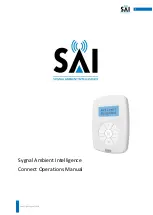
Error and system messages
4.5 Evaluating the interrupts of the ET 200S
IM151-1 FO STANDARD interface module (6ES7151-1AB05-0AB0)
56
Manual, 02/2010, A5E01075965-03
4.4.10
DP slave failure
DP slave failure
DP slave failure means data exchange will stop and user data (inputs and outputs) will no
longer be exchanged between DP master and DP slave.
Events
A DP slave failure can be triggered by the following events:
●
Events from the DP master: e.g. when loading a new configuration, in case of a
connection interruption or if the device is switched off
●
Events from the DP slave ("DP slave failure"): e.g. wrong disassemble conditions
(Page 55)
The DP slave still works and communicates, which means it delivers diagnostics, reacts to
events of the I/O modules and can process data records. The cause for the DP slave failure
can be determined based on the diagnostics.
4.5
Evaluating the interrupts of the ET 200S
Introduction
In the case of certain process states/errors, the DP slave saves one interrupt block for each
process state or error, containing the relevant information, in the diagnostic frame (DPV1
interrupt mechanism). Regardless of this, the diagnostic status of the DP slave is tracked in
the identifier-related diagnostics, the module status, and the channel-specific diagnostics.
Interrupts in DPV0 mode
For DPV0 mode, no interrupts are defined in accordance with the PROFIBUS standard. This
means that interface modules do not trigger an interrupt in DPV0 mode.
Interrupts in DPV1 mode
The ET 200S supports the following interrupts:
●
Diagnostic interrupts
●
Process interrupts
●
Remove/insert module interrupts
Requirements: Interrupts are only supported when you run the ET 200S with IM151-1 FO
STANDARD interface modules (6ES7151-1AB05-0AB0 or higher) in DPV1 mode.
In the event of an interrupt, interrupt OBs are automatically executed in the CPU of the
DP master (see information on Program design in the System Software for S7-300/S7-400














































